What it feels like to get a massage using real knives in Taiwan
Knife therapy has been practised in Taiwan for 2000 years and therapists use real blades. We tried it out in Taipei and survived the experience – just.
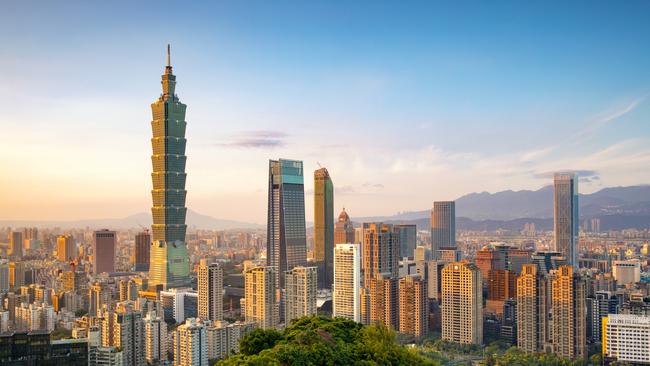
She flashes the pair of knives first. They are pristine and glistening and, as she steps towards me and begins to whirl them in the air, also keenly menacing. Chop, chop, chop. Like a pro she wields them, her smile as gleaming as the two cleavers she swishes in front of me. Without uttering a word, she has made very clear what she intends to do with them. And to me.
I must look terrified. Or perhaps she’s accustomed to this response. Or both. Because when the martial arts-like display ends and she’s still smiling, she rubs her fingers along the long edges of the knives and invites me to do the same. I am relieved to discover that, as indicated, the blades are indeed blunt.
But mostly I am amazed. Not because a knife-wielding woman is the last encounter I envisaged on a Taipei break, but because what she is offering – a massage, albeit with some questionable implements – is the very thing I’ve been seeking. Until now, when this grinning woman produced two cleavers in a dimly lit arcade deep below the city’s biggest train station, I was convinced I’d never find it.
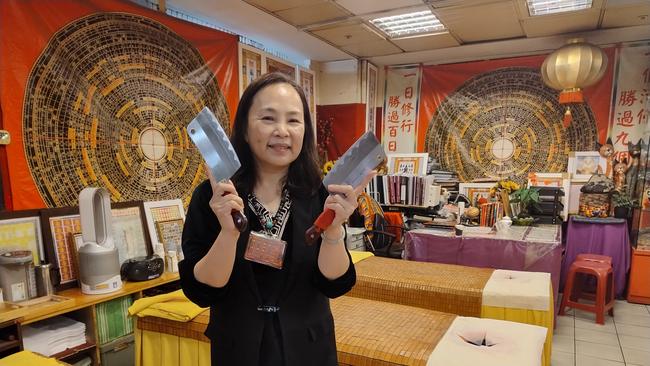
Outside, Taipei, too, is being pummelled. The biggest storm in 30 years has caused the entire country to be shut down, and at a dramatic speed. Landing in Taiwan only 72 hours earlier, there was barely a word about an approaching typhoon. Twenty-four hours later, it seemed that while Taipei was due to be hit, parts of the country would not, and so I planned a long day trip out of the capital to avoid the storm.
Even last night, as light showers began falling and news bulletins advised that the whole island was now due to be swept by ferocious winds and rain, I imagined spending the following day mooching indoors, admiring the local merchandise at the many shopping centres that hotel staff assured me would remain open, with plenty of time to fit in a long massage.
This morning, however, I wake to a different place. Normally frenetic roads are almost free of traffic, pedestrians have disappeared, classes are cancelled, office blocks are closed and shops shuttered. So are museums and cinemas and virtually anything else you might consider doing in a foreign city on a stormy day. About the only venues open, hotel staff advise, are convenience stores, and they become all but inaccessible as conditions worsen. Soon it is too dangerous to step across the adjoining side street to purchase anything.
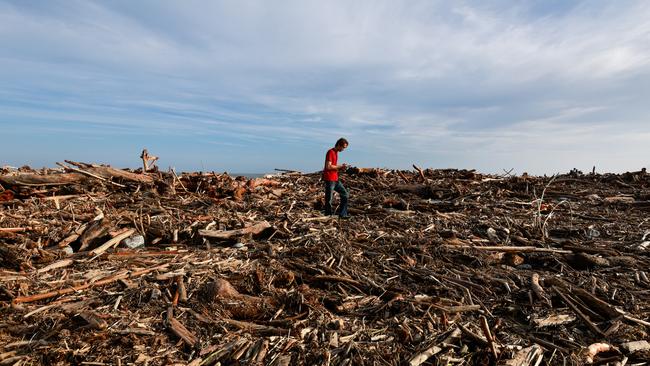
Even the enormous mall next to the hotel closes at the last minute. Its front doors, however, are left open, so that the stoic commuters brave enough to take any of the few trains still running can access the city’s main train station via a series of underground passages.
Seeking some exercise over this long day, I head underground via the mall, where the lights are off and usually busy stalls remain covered. Even Starbucks is shut. Empty tunnels, normally thrumming with life, lead to Taipei Main Station, where in the central hall dozens of buckets have already been placed beneath multiple leaks. One level down, sandbags lie at the entrance to some of the arcades, most of which are behind locked shutters. But a growing din and rays of light indicate that at least a couple are actually open, and over the next few hours more and more stall owners appear and set up goods for sale. In the middle of the worst typhoon this millennium, commerce continues.
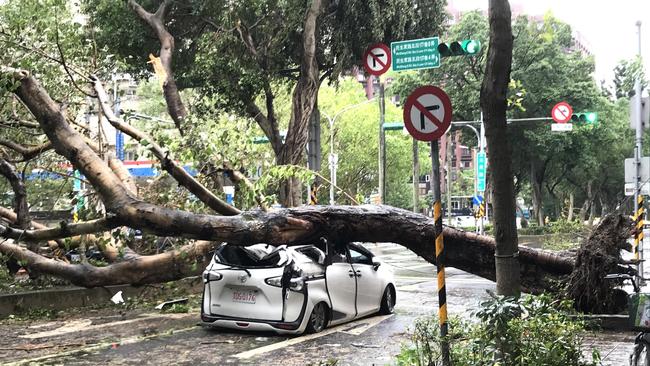
For the tourists who throng here, it’s an unexpected opportunity to stock up on wigs and T-shirts, penis-shaped cookies and sports shoes. By lunchtime, the few restaurants that are open are overflowing. As the storm rages above, there is an unlikely air of conviviality between customers who have nowhere else to go and business owners who, on what was supposed to be the worst of days, are making a killing.
It’s just as I am pondering that last thought that I spot the lady with the knives. All smiles and laughter, she flashes her tools in what is supposed to be a reassuring gesture, her chopping action indicating that yes, she would like to use the cleavers on my back. Shocked as I am to discover that a massage is a possibility here, mid-storm and several floors below ground, it still takes another long walk around, past a few busy video game parlours and an Indonesian eatery full of feasting patrons, to convince myself that a massage with knives is better than no massage at all. Probably.
In the end, seated facing forward in an angled chair, my back covered with a towel, I opt for the shortest possible session – 10 minutes, just in case. And so it begins. Whack, whack, slap. With the first blows my head shakes. I feel a wellspring of nausea. My rib cage seems to rattle. “OK?” the masseuse asks mid-strike, and, summoning whatever bravado you can imagine mustering when your head is buried in a massage chair and a stranger is pelting your back with cleavers, I feebly reply “yes”.
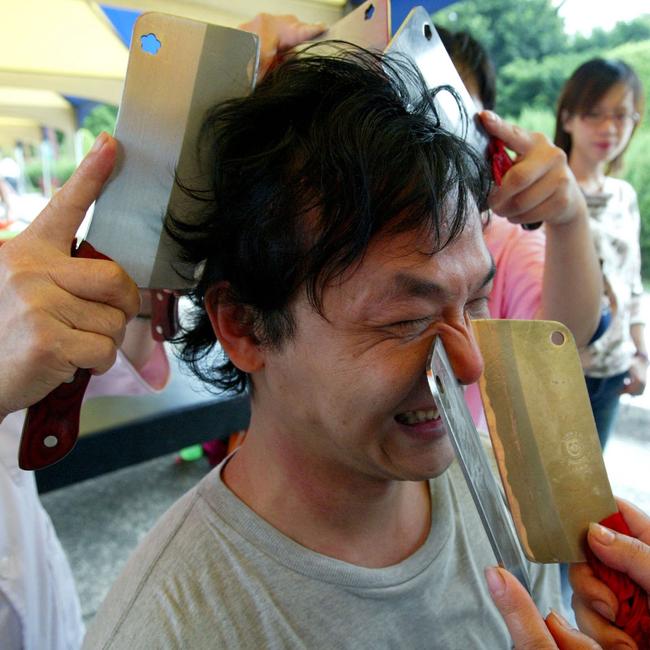
Confident that she has introduced me to the tougher end of the knife-wielding massage spectrum of intensity, I then manage to wheeze out what I assume is a rhetorical question: “So this is very strong?” Her reply is as crisp as the strikes to my shoulders. “No, no,” she insists. “Very light.”
I cannot say I love what ensues. For 10 minutes I am the percussion section of a human orchestra. She knives my back for what seems so long that I am convinced she has gone overtime gratis, and that I am now the hapless/lucky victim/recipient of a once-in-a-lifetime typhoon special.
Finally she discards the knives then chops my back with her hands a few more times to signify that our time together is over.
Warily, I sit up. The bliss I experience is extraordinary, not just because the agony is over but because in this unexpected place, on this unexpected day, I found what I wanted. And when it was over, it was actually worthwhile.
In the know
Knife therapy massages are available at stall 97 of the Taipei City Mall. Prices range from $T220 ($10) for a 10-minute back and shoulder massage to $T1200 for a one-hour full-body massage.
Fiona Harari travelled at her own expense.
If you love to travel, sign up to our free weekly Travel + Luxury newsletter here.


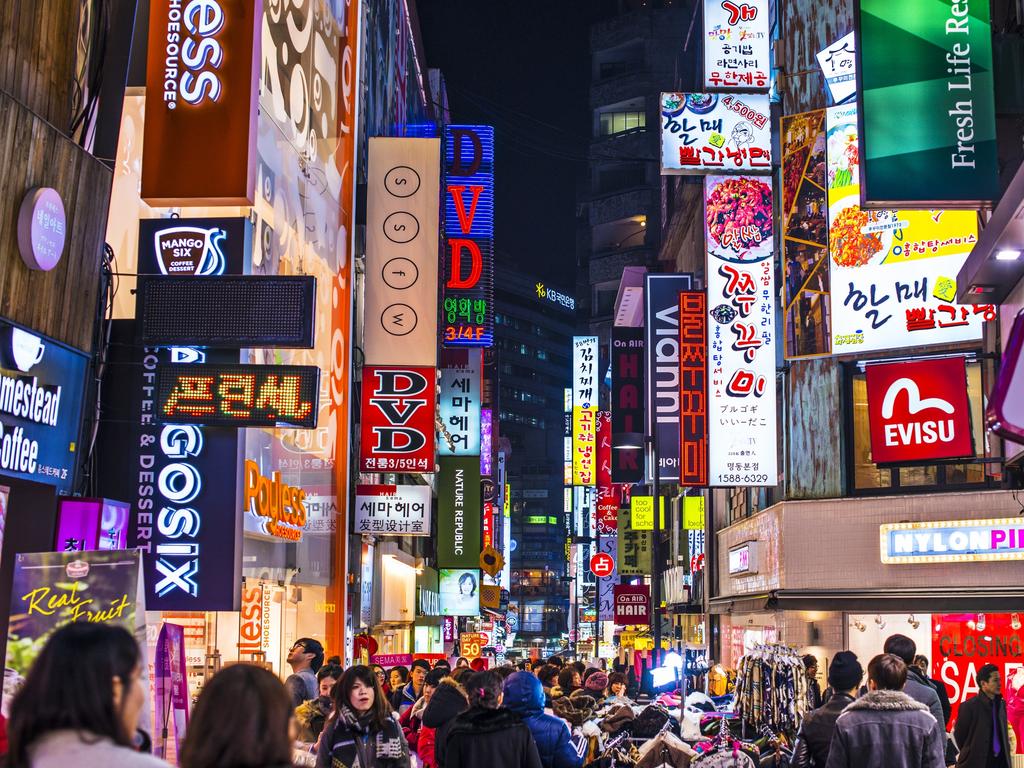


To join the conversation, please log in. Don't have an account? Register
Join the conversation, you are commenting as Logout